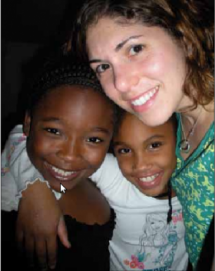ICAR Mixes Masters with Social Work GMU Graduate Students Focus on ICAR-MSW Degrees
ICAR Mixes Masters with Social Work GMU Graduate Students Focus on ICAR-MSW Degrees
 The iconic and stereotypical image of the social worker as "little old ladies in tennis shoes" that flourished in the early-to-mid-20th century has long been relegated to the dust bin of history. Never true, the social worker has always been on the front lines of community development. Day or night, social workers can be found in the most devastated neighborhoods conferring with families, advising troubled youth in recreational centers, and in general, using nascent conflict resolution skills to knit the delicate fabric of a community.
The iconic and stereotypical image of the social worker as "little old ladies in tennis shoes" that flourished in the early-to-mid-20th century has long been relegated to the dust bin of history. Never true, the social worker has always been on the front lines of community development. Day or night, social workers can be found in the most devastated neighborhoods conferring with families, advising troubled youth in recreational centers, and in general, using nascent conflict resolution skills to knit the delicate fabric of a community.
Wallace Warfield: A relatively new faculty member in 1992, it came quickly to my attention that ICAR M.S. students in particular wanted a more embedded field experience as part of their curriculum. So when ICAR first gave thought to the creation of the Applied Practice and Theory program, GMU's School of Social Work was the first stop in my information gathering. The practicum has been a critical teaching tool in the social work pedagogy for many years. In fact, the GMU Masters in Social Work (MSW) places a greater emphasis on community practice than many other MSW programs—and does so internationally.
The recognition that the disciplines of social work and conflict analysis and resolution held a shared worldview of building capacity in local communities resulted in the creation of the dual degree program in 2007. The MSW theory-building and in-field skills development in social change at the family and community level fits comfortably with the ICAR M.S. in Conflict Analysis and Resolution focus on developing reflective practitioners capable of functioning in diverse settings globally. ICAR M.S. requirements would be fully completed; six credits of electives, however, would be covered by MSW required course work.
Natalie Baum: As a student of the program I was confident I would gain a varied and rich education. However, I did not anticipate experiencing a natural fusion of the two degrees for some time, certainly not in the first month. When I walked into a Fairfax County meeting to address a Restorative Justice initiative on behalf of my social work field placement, Black Women United for Action, and recognized ICAR student Erin-Rose Feeley and conflict resolution education authority Marge Bleweis, I quickly understood the dual degree would offer much more than I imagined. Throughout the meeting I felt empowered by my accumulated knowledge from my studies at ICAR. Halfway through the meeting, in an unforced and relevant moment, conflict resolution vocabulary rolled off my tongue. I had melded conflict theory with social work advocacy to analyze the community conflict at hand. I felt simultaneously validated and elated. This rewarding experience early in my education affords me great comfort in knowing that in May 2010 I will graduate George Mason University armed with a dual degree education that significantly parallels the collaboration of conflict analysis and resolution and social work in real-world practice. It is anticipated that in the formative years of this program, only a few students will select the dual degree route. However, as the word spreads throughout the student body of the potential for this degree, we should not be surprised if an increasing number of students follow suit.



